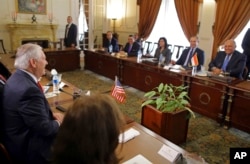U.S. Secretary of State Rex Tillerson began a five-nation visit to the Middle East in Egypt, where he called for next month's presidential elections to be transparent and credible. His talks Monday with his counterpart Sameh Shoukri touched on topics including economic and military cooperation, and the fight against terrorism.
In a joint news conference at the old foreign ministry compound, Tillerson and Egyptian Foreign Minister Shoukri highlighted bilateral issues, including the fight against terrorism, and U.S. concerns about Egypt's presidential elections. Both men stressed that they had agreed not to interfere in each other's internal affairs.
Tillerson noted that discussions included "the promotion and protection of human rights and the vital role of civil society in Egypt" and the upcoming Egyptian presidential election in March, in which incumbent President Abdel Fattah el-Sissi is running largely unopposed.
"The United States, as it does in all countries, supports a transparent and credible electoral process and all citizens being given the right and the opportunity to participate freely and fairly," said Tillerson.
When asked about alleged political oppression in Egypt, Shoukri responded that "development in the social and political field is an evolutionary process."
"The Egyptian people have shown their commitment and their determination and their ability to change their course and to indicate their dissatisfaction if they deemed they were dissatisfied," he added. "They have been able to change two governments in the last seven years and they have undertaken legislative elections and know how to protect their rights and advocate."
Terrorism
Tillerson stressed that both the U.S. and Egypt are determined to jointly pursue the fight against terrorism. He noted that Egypt is a key member of the U.S.-led coalition against the so-called Islamic State group:
"We agreed that we would continue our close cooperation on counter-terrorism measures, including our joint commitment to the defeat of ISIS, and Egypt has been a very important member of the defeat-ISIS coalition from the beginning," he said. 'Egypt deals with the threats of ISIS themselves and are dealing with it currently in the Sinai."
Egypt began a country-wide anti-terrorism operation, dubbed Sinai 2018, on Friday. It has been launching air strikes against terrorist targets, including arms caches, and attempting to disrupt arms supply routes from Libya and Gaza.
Jerusalem
In response to an Arab journalist's question about U.S. President Donald Trump's decision to recognize Jerusalem as the capital of the State of Israel, Tillerson insisted that the U.S. remained committed the peace process and that several key points of the president's decision were being misinterpreted.
"In the announcement President Trump made regarding Jerusalem, he also made two very important points, as well, one of which was, he was not advocating for any change to the status quo as to the oversight of the holy sites, recognizing the proper role of existing authorities," he said "And the second is that the final boundaries of Jerusalem are yet to be determined and will be decided among the parties."
North Korea
When asked about Egypt's relations with North Korea, Shoukri pointed out that many U.S. allies also have diplomatic ties with Pyongyang, but stressed that economic and other ties were minimal.
"Egypt has had normal diplomatic ties with North Korea, as do many Western and NATO members," he said. "And those ties are, in terms of the relationship, limited to representation and there is almost no existing economic or other areas of cooperation."
Secretary Tillerson added that the U.S. is still evaluating eventual diplomatic negotiations with North Korea. But he pointed out that it's "up to Pyongyang to decide when they're ready to engage with [the US] in a sincere and meaningful way [since] they know what has to be on the table for discussions."
Tillerson met with el-Sissi at the al Ittihadiya Presidential palace before heading to the airport and continuing his tour, with stops in Kuwait, Lebanon, Jordan, and Turkey.





